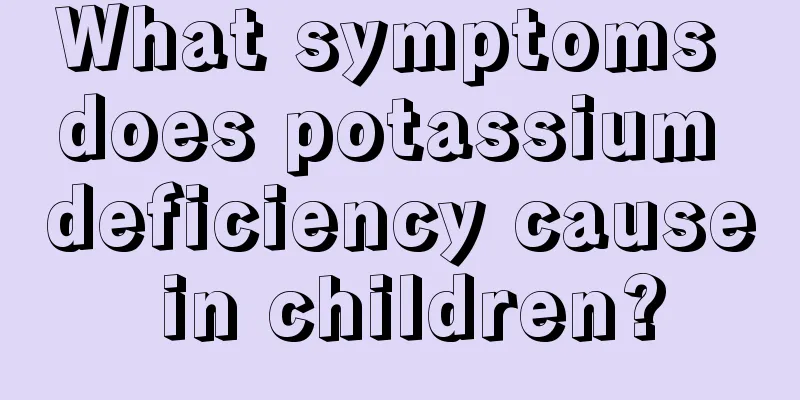What symptoms does potassium deficiency cause in children?

|
When children are deficient in potassium, parents should certainly pay attention to it and supplement their children with potassium scientifically. When children are deficient in potassium, they are prone to general weakness, fatigue, weakened heartbeat, or nausea, vomiting, diarrhea and other problems. If children are deficient in potassium, parents should pay attention to supplementing them with potassium correctly and give their babies more bananas, strawberries, citrus, yams, edamame and other foods. 1. Symptoms of potassium deficiency in babies 1. When the body lacks potassium, the baby will suffer from general weakness, fatigue, weakened heartbeat, dizziness and severe potassium deficiency can also cause paralysis of the baby's respiratory muscles and death. 2. Low potassium will slow down the baby's gastrointestinal motility, leading to intestinal paralysis, aggravating anorexia, and causing symptoms such as nausea, vomiting, and abdominal distension. 3. Tachycardia and irregular heartbeat, muscle weakness, numbness, irritability, nausea, vomiting, diarrhea, low blood pressure, mental confusion, and psychological apathy. 2. Why do babies lack potassium? Reason 1: Long-term fasting or insufficient food intake, or insufficient potassium supplementation in fluid replacement leads to potassium deficiency. Reason 2: Vomiting, continuous gastrointestinal decompression, and small intestinal fistula cause potassium loss through extrarenal pathways, leading to potassium deficiency. Reason 3 - Excessive excretion of potassium from the kidneys. For example, the use of diuretics such as furosemide and uric acid, potassium loss due to renal tubular disease, and excessive mineralocorticoids can cause continued potassium loss when blood potassium is not high, leading to potassium deficiency. Reason 4 - Metabolic acidosis. Treatment with glucose and insulin or cellular water and nutrient intake can cause potassium to enter the cells from the extracellular fluid, leading to potassium deficiency. 3. What to do if your baby is deficient in potassium The key to preventing and treating low potassium is potassium supplementation. Oral administration of 10% potassium chloride solution can be used clinically, but the safest and most effective method is to eat more potassium-rich foods, especially fruits and vegetables. Fruits rich in potassium include bananas, strawberries, citrus, grapes, grapefruit, watermelon, etc. Vegetables such as spinach, yam, edamame, amaranth, and onion are also rich in potassium. Soybeans, mung beans, broad beans, kelp, seaweed, yellow croaker, chicken, milk, cornmeal, etc. also contain a certain amount of potassium. Various fruit juices, especially orange juice, are also rich in potassium and can replenish water and energy. It is determined that tea contains 1.1% to 2.3% potassium, so it is the best cooling drink in summer. |
<<: Can babies who are allergic to cow's milk replace their infant formula with soy milk powder?
>>: How to reduce swelling on baby’s hands?
Recommend
What to do if your child has vomiting and diarrhea
Regardless of the season, vomiting and diarrhea a...
Normal values of six sex hormones in children
The six-item test of sex hormones in children mea...
What to do if a child has a 100-day cough
It is enough for parents to worry if their childr...
How to treat white mouth sores in babies
If parents find that their baby is crying incessa...
Six simple and correct ways to quickly reduce fever in children
When their children have a fever, every parent is...
Baby, why is your hair falling out?
Every adult will experience hair loss, and it is ...
Correct way to massage for indigestion in children
Children at home are treasures. Do you know the c...
What shape of pacifier is good?
If mothers have ever bought a pacifier, they know...
What should I do if my baby has a stuffy nose and snores?
Taking care of a child is a very difficult task. ...
Is it OK for a baby to stand up too early?
After the baby is born, the mother will definitel...
What to do if a 2-year-old child has a high fever and convulsions
Colds and fevers are common diseases among childr...
Contents of newborn blood screening
The health of babies is what many parents are mos...
How to treat a child with white tongue coating and cough?
Under normal circumstances, the tongue coating of...
What to do if your baby has mucus in his stool
Many experienced parents, when taking care of the...
What to do if your three-year-old baby has a cough and runny nose
Three-year-old babies have begun to gradually ada...









